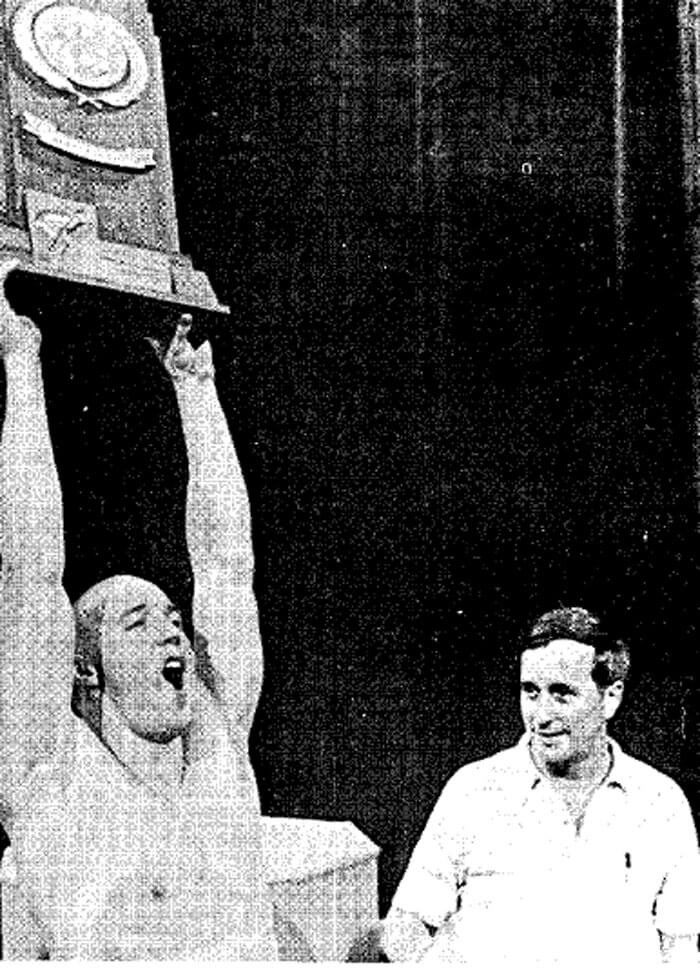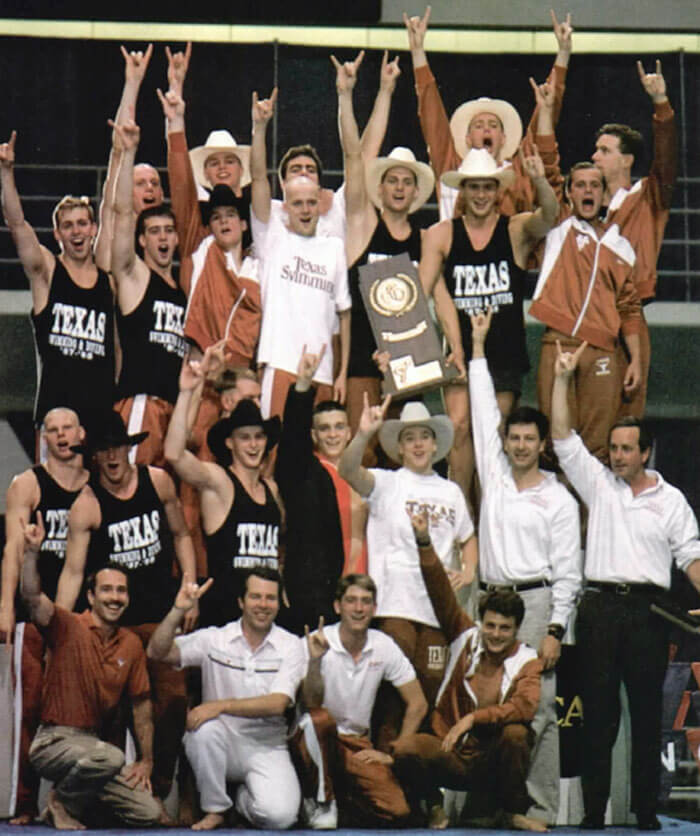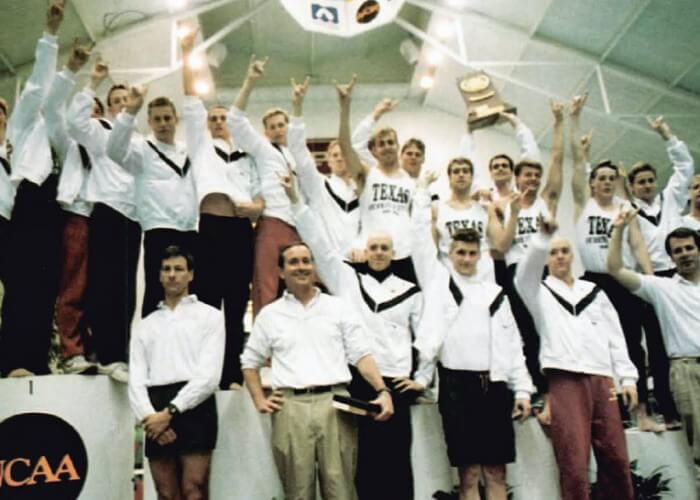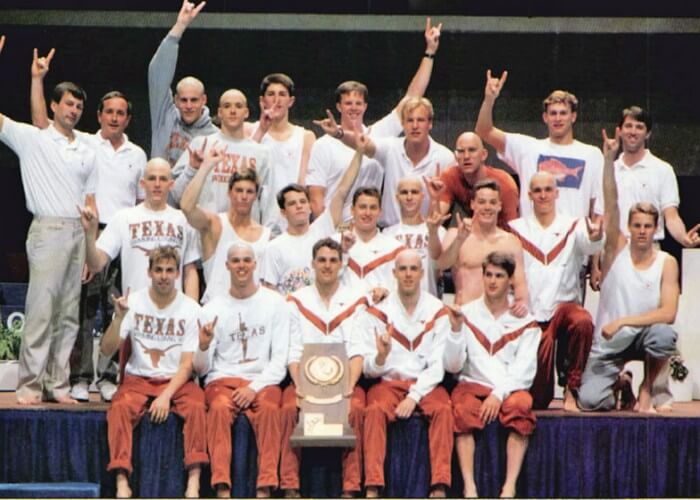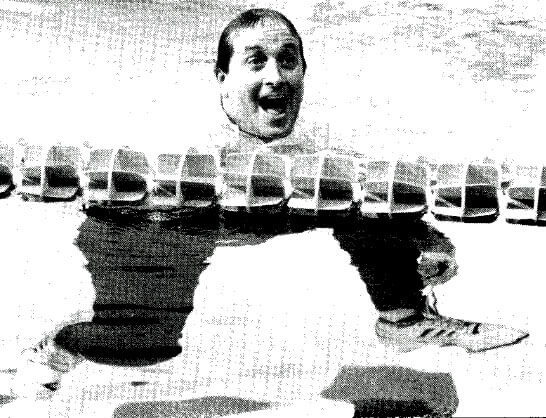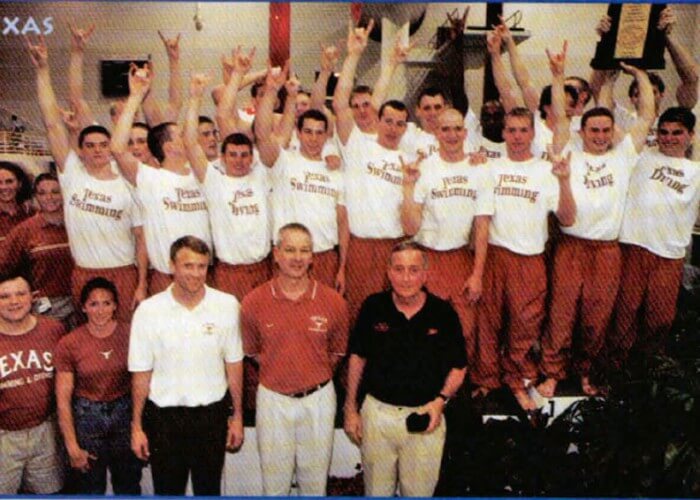11th Men’s NCAA Championship Within Historic Reach For Coach Eddie Reese
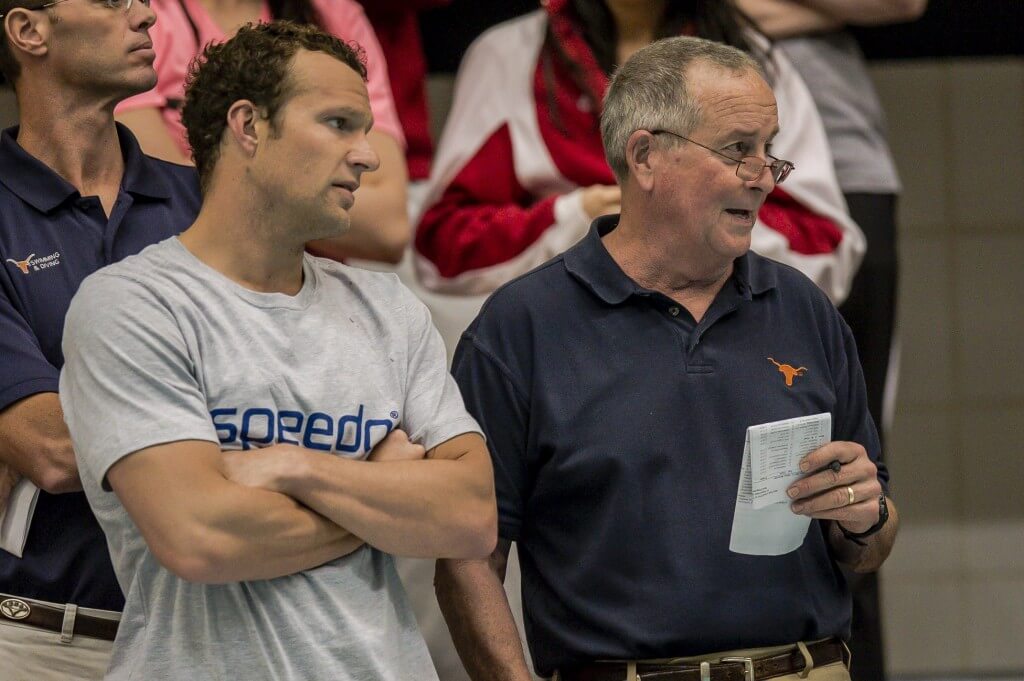
Editorial content for the NCAA Division I Championships is sponsored by Nike Swim. For full Swimming World coverage, check out our coverage page.
Editor’s note: This article was originally posted on March 25.
By Jeff Commings
Eddie Reese has a chance to make history this week at the men’s NCAA Division I championships … that is, if his Texas Longhorns can win the team title.
A win this week would mark Reese’s 11th at Texas, which would tie him with the great Ohio State coach Mike Peppe for the most team titles won at a men’s meet. If it happens, Reese would still be tied with Peppe for third among all swimming coaches behind the 13 for Richard Quick and 12 for David Marsh, both of whom won titles at the men’s and women’s championships. Though the title count only applies to head coaches, it should be noted that Kris Kubik has been Reese’s assistant coach for all 10 of those championship years. That’s likely a record among assistant coaches.
Texas will be in a dogfight for this year’s title with California, mirroring the battle the two teams waged last year. Texas finished second behind California in 2014 to mark Reese’s 28th top-three finish and his ninth consecutive top-five finish.
Every team title under Reese’s tutelage has been an exciting one, with some coming down to the final event of the meet. Below is a rundown of each of Reese’s 10 previous victories.
1981: Eddie Reese wins first NCAA title
Top three teams: Texas (259), UCLA (189), Florida (180)
Not only was 1981 the first time Eddie Reese held a national championship trophy in his hands, it marked the beginning of an era of winning for Texas swimming. At the AIAW meet – the championship meet for women’s collegiate swimming until the NCAA took it over in 1983 – Texas won the title over Stanford under the guidance of Paul Bergen. It was the first time the same school won the women’s and men’s collegiate swimming and diving titles in the same year, and not the last Texas would earn that distinction.
Reese couldn’t have asked for a better place to win his first title, doing so at the Texas Swimming Center. It was his third year as Texas men’s coach and continued an impressive trajectory in college swimming after a 21st-place finish in 1979 and second in 1980. It was a fast meet, with 10 American/NCAA records set in Austin, but the depth of the Longhorns was too much for UCLA’s top-end strength.
Scott Spann, Kris Kirchner and Clay Britt were three instrumental players for Texas, each winning individual events.
1988: Back on top, Eddie Reese begins a dynasty
Top three teams: Texas (424), Southern California (369.5), Stanford (276.5)
The Texas Longhorns had fire in their bellies at the 1988 championships. The previous year, Texas finished fifth for their second-worst showing at the meet and the team was not going to let that happen again.
“I never saw (Reese) so upset,” star breaststroke Kirk Stackle said in the May 1988 issue of Swimming World Magazine. “He got everyone geared to work harder. It’s amazing how much work we put in compared to last year.”
The result was a blowout, beating USC by 54.5 points. The sophomore class would turn out to shake off their freshman year jitters and lead Texas to the victory. Stackle and Doug Gjertsen were big point scorers, with Stackle winning the 200 breast and Gjertsen winning the 200 free.
Texas claimed one of the two American records at the meet, cementing the team win with a 2:52.01 in the 400 free relay. Gjertsen was on that relay, as was Chris Jacobs and Shaun Jordan, who would virtually come out of nowhere to make the 1988 Olympic team. Keith Anderson, an unknown before the meet, was also on the record-setting squad.
With the bulk of the scorers on Texas’ team in the sophomore class, many wondered what was in store for the 1989 championships.
1989: Eddie Reese takes two in a row
Top three teams: Texas (475), Stanford (396), Michigan (315)
Much of the attention at the 1989 NCAA championships was focused on the races featuring names from the 1988 Olympics, since the team championship was hardly in doubt. Texas was just as dominant in 1989 as the previous year, letting swimmers such as USC’s Dave Wharton take the spotlight with an American record in the 200 IM and a big win in the 400 IM. But Texas won five events and was in the top three in four others to give Reese his third team title.
“We talked a lot about (repeating the title) a lot this year,” said Reese in the May 1989 issue of Swimming World Magazine. “We knew it was going to be tough. It’s always easier to chase than to be chased. And it’s always tougher when you get to the site of the meet. … Somebody wished me luck the first day. I told them, ‘I don’t want any luck. I just want to win the close ones.’ We did that, and that takes some special character.”
Some of the highlights from the 1989 meet was the introduction of the 200 medley relay and 200 free relay to the program, and David Berkoff swimming underwater for virtually the entire race to post an American record time of 47.02.
1990: Texas wins a meet for the ages
Top three teams: Texas (506), Southern California (423), Stanford (354)
If you thought the last two wins for Texas were blowouts, the 1990 meet was pretty much over before it began. As reported in the May 1990 issue of Swimming World Magazine,
The second night of the men’s NCAA Swimming Championships was over and already the victory nod was being given to two-time defending champion Texas.
Stanford’s Skip Kenney approached Texas coach Eddie Reese on the deck of the IUPUI Natatorium, shook his hand and said, “Hey, Don Meredith just called. He said something about …” Kenney let the sentence peter out, while he just smiled, allowing Reese to fill in the television announcer’s famous “The Party’s Over” line.
“We’ve got to be realistic,” said USC coach Peter Daland. “We’re swimming against a very good team that’s swimming at maximum performance.”
It was one of Texas’ best NCAA championships, with six wins and top-three finishes in five others. Though much of the talk about the meet centered on James “Doc” Counsilman’s retiring from coaching at Indiana after many years and the explosive 200 breast battle between Mike Barrowman and Kirk Stackle, Eddie Reese’s dominance in college swimming could not be ignored, nor could his drive to be the best.
“I really like the way we’re swimming,” Reese said. “You train all year for one goal, and that’s to swim faster. It all ends up here. We are swimming fast and that’s the key.”
1991: Four in a row for Eddie Reese
Top three teams: Texas (476), Stanford (420), Florida (313)
Though Texas was without the talents of Doug Gjertsen and Kirk Stackle, the Longhorns couldn’t be stopped on their way to a history-making fourth consecutive championship. Indiana’s six in a row and Michigan’s five in a row were still the benchmarks, but it put Texas on par with the four in a row that Southern California won in its heyday in the mid-1970s.
Shaun Jordan was the key senior for the group, winning the 50 and 100 freestyles, a big accomplishment for a swimmer who was a walk-on at Texas as a freshman. With wins in four of the five relays, the win – like the previous three years – was never truly in doubt. On that squad was a freshman from San Antonio named Josh Davis, who scored in the championship finals of the 100 and 200 freestyles five years before making his first Olympic team.
On the surface, things looked to be smooth sailing for Reese and the Longhorns, but the coach said otherwise.
“You don’t sleep through these things,” Reese was quoted as saying in the May 1991 issue of Swimming World Magazine. “You come here and you experience more pain. I was so worried Stanford would score 2,000 points in the backstroke.”
1996: An unusual way for Eddie Reese to win No. 6
Top three teams: Texas (479), Auburn (443.5), Michigan (358)
If there was ever a more difficult way to win an NCAA team championship, the Texas Longhorns found it in 1996. Though nearly every swimmer scored points throughout the three-day meet, Texas only stood at the top of the podium once, in the 200 free relay to start the meet. It was the first time in 13 years that a team won the meet without winning an individual event.
“Our depth was real important,” Reese said. “Two in the top 8 and four in the consols – that’s not just depth, that’s good depth. We knew we were good in every event.” And Texas scored points in every event but diving.
With this sixth team title, Reese was now tied for third on the list of the winningest coaches with Doc Counsilman, Skip Kenney and Matt Mann. “At my age, I don’t remember the other five!” the 54-year-old said at the time. “I just take them one at a time. I told our swimmers to go fast and be willing to commit to it. And that’s what they did.”
2000: Eddie Reese wins No. 7 at short course meters NCAAs
Top three teams: Texas (538), Auburn (385), Arizona (360.5)
In the first of two NCAA championships that would be swum in short course meters to coincide with the Olympics, a lot of the discussion was about the world records being set. But it turned out to also be Eddie Reese’s biggest margin of victory at the NCAA championships, beating Auburn by 153 points. The three relay victories and the 100 back win by Matt Ulrickson went a long way to help the Longhorns overcome defending champions Auburn, as did the two springboard diving wins by Troy Dumais.
In fact, the Swimming World Magazine coverage of the meet in the May 2000 issue focused so much on the record-setting meet and the outlook for many of the swimmers for the Olympics later that year that only one of the three pages focused on Texas’ victory. But in the end, it was a thrilling win for Reese, who admitted to having troubles getting his athletes ready for NCAAs in the previous years.
“Our philosophy has just been to keep it fun, to keep smiling and keep laughing,” Reese said. “the last two years, we worked too hard coming into the meet, and now I’m getting them the right amount of rest. We knew if things went our way, we could do a lot.”
2001: Olympic stars help Eddie Reese win No. 8
Top three teams: Texas (597.5), Stanford (457.5), Tennessee (330.5)
Looking back on the 2001 NCAA championships, you might think, “Of course Texas won the NCAA meet! They had Hansen and Crocker!”
Those two – Brendan Hansen and Ian Crocker – would become two of the most famous names in swimming history. Crocker made the 2000 Olympic team and won medals, while Hansen famously missed selection in both breaststrokes in 2000 but came back strong to win multiple medals in 2004, 2008 and 2012.
In 2001, the two were talented college freshmen who did their part to help Texas record another dominating performance, beating Stanford by 140 points. One of the biggest races of the meet came in the 200 breast, where Hansen took down Mike Barrowman’s hallowed American record of 1:53.77 with a 1:53.11. In addition to the win in the 100 breast, Hansen was on his way to becoming the first person to win both breaststrokes all four years. Once again, relays were key for Texas as the Longhorns won four of the five, and diving continued to be a strong key to keeping the team title in Austin.
The following year would continue to showcase why diving remains an important part of the championships.
2002: Depth and diving brings Eddie Reese title No. 9
Top three teams: Texas (512), Stanford (501), Auburn (365.5)
What a difference a year makes. In 2001, Texas won the meet by 140 points. In 2002, the Longhorns won in a nailbiter by just 11 points over Stanford. It was the closest meet in 18 years. Though every event, every stroke and every distance played a part in the ninth win for Eddie Reese, it was Matt Scoggin’s divers who truly helped win the meet.
With Stanford scoring zero points in diving, Texas’ 113 points on the springboard and platform events could be viewed as the true deciding factors in deciding the overall winners. But the swimming was also spectacular. Brendan Hansen won both breaststrokes for the second year in a row and Ian Crocker won the 100 fly at NCAAs for the first time. Texas was unable to win any of the five relays, marking the first time in many years that a team championship was won without a relay victory. Stanford won three of those relays to help offset some of Texas’ diving points (120 points for three relay wins), and were dominant in the backstroke events to balance Texas’ strength in breaststroke.
2010: Illness takes the headlines for Eddie Reese’s 10th title
Top three teams: Texas (500), California (469.5), Arizona (387)
The major conversation surrounding the 2010 championships was the norovirus that felled swimmers from three teams and forced a one-day delay to the start. But once the meet got going, it was Eddie Reese who was holding a team trophy for a tenth time.
It wasn’t easy. California, using the immense talents of Nathan Adrian and Tom Shields, looked on track to give its head coach Dave Durden his first national title. But something happened on the third day, as Texas put up a superior prelims session to give itself the ability to take the win. After placing second in 2008 and 2009, this year’s catalyst was equally strong relays and individual performances.
“I never really count numbers,” Reese was quoted as saying in the May 2010 issue of Swimming World Magazine. “It’s always a 15- to 18- to 19-man effort that does it. To get everybody headed in the right direction in early September, that takes trust on their side and trust on the coaching staff’s side.
“We never set a goal to win (before the season). We set a goal to get better and try to figure out what it takes to get better. It really helps to win because it doesn’t happen very often.”




